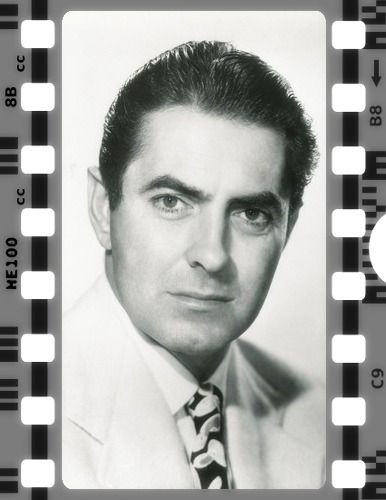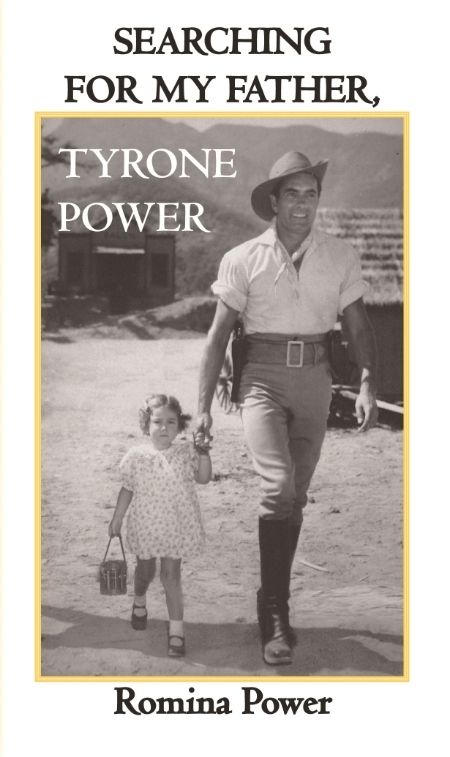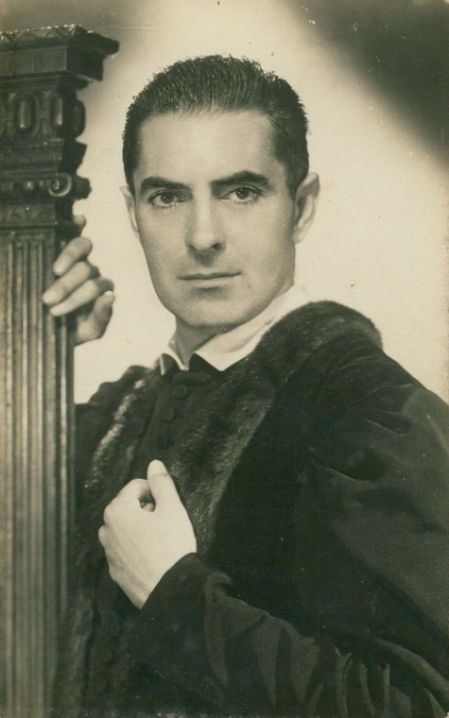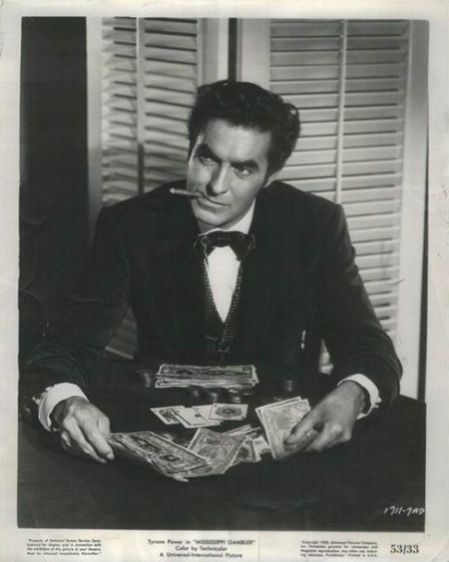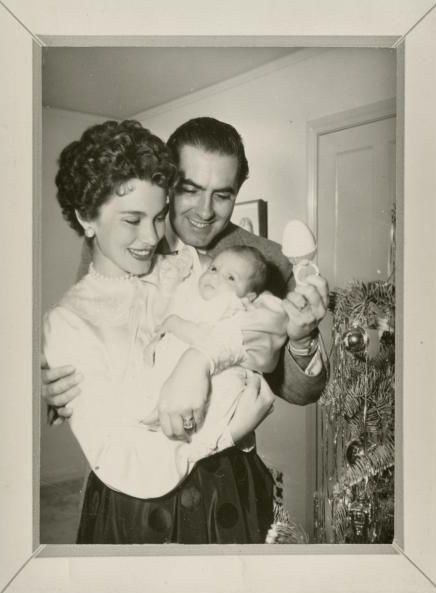“Try for beauty and truth in all you attempt.” ~ Tyrone Power, Sr., to his son, Tyrone Power III
Searching For My Father, Tyrone Power, written by his elder daughter, Romina Power, is a work of love that his fans will certainly love. Before the publication of Romina’s memoir/biography, there had only been a couple books on Power that did him any justice. The first was The Films of Tyrone Power by Dennis Belafonte and Alvin H. Marill. Released in 1979, this mostly pictorial record was another in the series of “The Films of…” which Citadel Press published. The second book– also released in 1979– was Fred Lawrence Guiles’ exceptional Tyrone Power: The Last Idol. Since the late ’70s, however, the only major work on Power has been Romina Power’s biography which has had two manifestations. It was first published in Italy several years ago. Unfortunately, unless you read Italian, the book was not available to many fans on this side of the ocean.
However, in May of 2014, the English-language version of Searching For My Father finally made its American debut at the Pickwick Theatre in Park Ridge, IL. Limited to a 1,000 copies, this was a first edition available only at centennial events honoring Tyrone Power. Considering that Power himself was an avid collector of first edition books, this was a nice homage to him. (The mass market version is expected to be out by the end of 2014.) Though it took years to see the light of day in this country, I can tell you that it’s been worth the wait. This is a beautifully written and compiled book for the global fans of Tyrone Power.
Though I had been fortunate to see excerpts of the book prior to its release, it wasn’t until weeks after the May 1 event at the Pickwick Theatre that I was able to read the entire book. From the very beginning, the reader is pulled in emotionally. Romina writes of hearing her father’s voice for the first time. Since she had grown up in Italy, she had only seen her father’s films with his voice dubbed. But when Romina bought a record album of him reading the poems of Lord Byron, she was struck not only by the sound of his voice, but by the message he seemed to be conveying to her through the expanse of time. The poem was My Daughter. Though it was Byron addressing his own daughter, Allegra, the words seemed to speak to Romina and to her own sense of loss of not having her father in her life. She was only seven when he died. Romina immediately shared this recording with her younger sister, Taryn. This would be the first of many discoveries and revelations for them. The book is Romina’s decades-long search to find out who her father was through the people who knew him best.
Though Tyrone Power lived only 44 years, his life touched so many others. He was a worldwide movie star, but over the decades, Hollywood has forgotten him; many years have passed since his death in 1958. So many people from that era have since passed on. Fortunately, Romina Power took the initiative to find out what she could before it was too late. Many of the most important characters from her father’s life were interviewed back in the 1970s and 1980s when names like Henry Fonda were still with us. It’s no easy task by any biographer to try and present a total picture of someone, but what Romina has created is a stunning mosaic made up of many pieces. Each has their own value and points to a larger picture.
The book is structured around dozens of interviews with those who knew him– close friends like Watson Webb or Cesar Romero– and family members like Tyrone’s sister, Anne. It is not your typical, linear biography due to Romina’s jumps in time, but the narrative cross-cutting is chronological and follows the arc of her father’s life and career. What unfolds is a fascinating record and oral history that is a piece of invaluable research. Mixed into the biography is family history in which Romina talks about her acting heritage. There are also her own accounts of visiting places like Ireland, the home of her ancestors on her father’s side, and her poignant and difficult trip to Spain. It is here where her father had died so many years earlier while making Solomon and Sheba. These almost poetic impressions and evocations of place are important to the tone of the book; they give it an intimacy other biographies lack. As readers, we never forget that this is a daughter’s search to understand the father she never really knew.
Power served with distinction as a U.S. Marine during World War II.
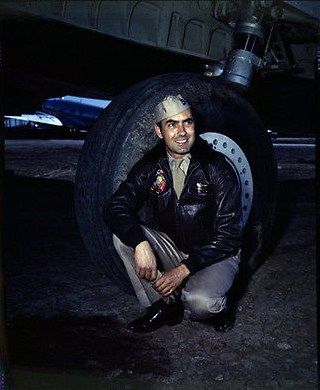
There are recurring traits and themes– most notably Tyrone’s humor and generosity. He was a very giving person, and reading this book I couldn’t help but wish I had known him. Tyrone comes across as someone who was genuinely good– by no means perfect as none of us are, but someone who was able to make time for another despite the demands of his profession. The characteristics that were so attractive onscreen, which had made him a hero to millions, inspired confidence in those around him off-screen. “His smile conveyed that everything would be okay.”
There are many examples of Tyrone making time for others. Whether it was going to a friend’s synagogue in order to read a passage from Scripture or helping a studio security guard pay for his wife’s operation, these are little-known incidents that reveal the quality of his character. There was a fundamental decency about Tyrone Power. There are so many stories of this generosity that I’m sure most people were never aware of until now.
Make-up test for Nightmare Alley (1947), widely considered to be Power’s finest performance.
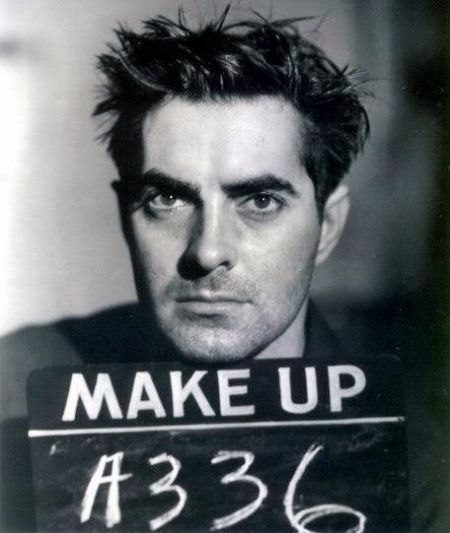
Romina Power is an artist who finds expression through many forms, whether it’s singing or painting or writing. This expression manifests throughout the 320+ pages. She never inserts herself into the interviews, instead allowing the subject to unfold their recollections uninterrupted, but her reactions and how she describes them afterward are heartfelt. There are surprises here, both good and bad. It is a story that is sad and haunting, but also uplifting as we feel Tyrone’s presence– not as a distant memory or as shadows on a movie screen– but as a real presence in the lives of those who knew and loved him.
One of the many strengths of Romina’s book is her inclusion of letters her father had written reflecting his concerns and passions. Many are from his war years and contain thoughts of home. An example that stands out to this reader is one he wrote as a U.S. Marine during World War II. His description of Yokohama, Japan, in the aftermath of its defeat is especially vivid. Tyrone’s humanity comes through in all these letters whether they’re about the war or directed towards a loved one. Additionally, Romina includes a fascinating and revealing “novel” that Power had started between flying missions but which he never finished. In the excerpt that she includes, Tyrone takes on a character named “Fred,” perhaps to obscure the autobiographical nature of his own story. (The Fred Guiles biography also recounts this novel while providing commentary on what Tyrone was saying about himself. Here, Romina includes more of the unbroken text.)
Tyrone Power was a seeker not unlike the character he portrayed in The Razor’s Edge (1946)– a seeker of knowledge and of meaning in life. His intelligence is another trait that recurs throughout the book. We see this in the passionate letters he would write. They harken back to those Tyrone Power, Sr., had written to his wife, Patia, which are also included. A form of expression that seems antiquated in this impersonal age of texting and emails, these articulate letters depict a more literate time when people knew how to write and express themselves. With Tyrone, they reveal someone trying to understand the world and his place in it.
Tyrone Power’s interest in philosophy and religion and his own views on life (which he expressed in an article in 1945) are elaborated. But unlike today’s “stars,” Tyrone never tried to foist his views onto others. He never professed to be an expert on anything political and never used his status as a star to get on a soapbox. But quietly, he was continually searching. It’s also noteworthy to see the kinds of books that influenced his outlook. One in particular was Kahlil Gibran’s 1923 book The Prophet.
Tyrone’s life and the choices he made were also shaped by his relationships. There were many women in his life. It was said by one of those interviewed that Tyrone was “in love with the idea of being in love.” He always needed to have someone in his life, going from one relationship immediately into the next. This led to a great deal of personal turmoil when it became apparent that neither was compatible with the other for the long-term. Despite these frustrations and entanglements, Power never became a bitter man. He never directed anger in the direction of others. There was a lot he kept bottled inside.
We gain a sense of who these women were in his life. In fairness to his three wives– as well as to those he knew in-between– we don’t have the full picture of who they were as individuals, although his first wife, Annabella, seemed to be the most open about her years with Tyrone. There are moments in the telling when its easy to make snap judgments on them, such as when something is said that puts one of them in a negative light. But it’s important to understand that there is another side we’re not seeing completely. It’s evident that these women who were closest to him– Annabella, Linda Christian, and Debbie Minardos– all clearly loved him and were important to him during each stage of his life.
Portrait of Tyrone done by Claire Trevor…
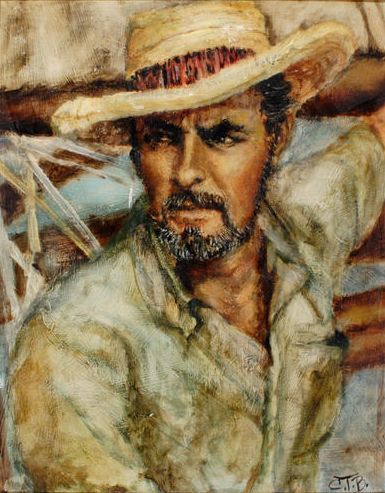
Remote impressions of her childhood seem to be all that is left for Romina. She recalls a home and a garden where she played, but her father was an elusive figure in these recollections. In her adult consciousness, she reached back into pre-memory, but her father was always just out of reach. He was blocked out perhaps by the trauma of losing him and only attainable in dreams, appearing to his daughter as a figure in white. This sense of loss is deeply moving. It’s the underlying theme that brings a soul to the book. Despite this gap in her personal timeline, there is a degree of solace for Romina- of acceptance of what was taken from her. There is a final realization and understanding that Tyrone still lives through her, through her sister Taryn, and through their brother Ty– as well as through all the people he has touched then and now.
Tyrone Power was a complex man who had to reconcile his public self with his private life. Despite this complexity, you feel closer to understanding who Tyrone Power was when you read Searching For My Father. The reader makes these discoveries with Romina. This is her personal journey towards truth, and in this day when other biographers rely on sensationalism to sell copies, truth can be an elusive thing. Romina’s intent is to tell a sincere story and leave as accurate a record as possible of a man who was more than a movie legend.
~M.H.
